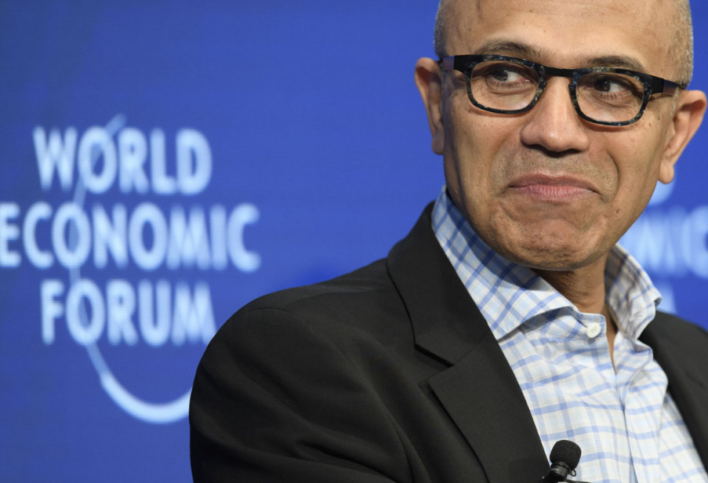Satya Nadella warns world is quickly “running our of computing capacity”.
In a key note speech at the World Economic Forum in Davos, Microsoft CEO Satya Nadella issued a stark warning that the world is quickly running out of the computing capacity it needs to tackle the advanced problems humanity is facing, and power ever more sophisticated technology.
Put simply, Nadella says the world doesn’t just need more super computers, but super-fast quantum computers, but more research was urgently needed to make that a reality.
As an example, Nadella claimed that quantum computing could tackle some of the world’s most pressing issues, like designing and creating the blueprint for a carbon-absorbing catalyst to help tackle climate change.

Microsoft CEO Satya Nadella says the world is running out of computing power and needs urgently needs more.
Moore is less
“Moore’s Law is kinda running out of steam,” Nadella told the assembled delegates, referring to the fact that the power of computer chips is no longer doubling every two year as it did for the best part of three decades. Boosting computer efficiency using current technology has just about reached its limit, Nadella concluded.
But solving climate change and other ‘big issues’ will prove next to impossible without that dramatic increase in computer processing power.
Quantum computers use the power of atoms to perform memory and process tasks, making it faster than average computers. Quantum computing is needed “to create all of these rich experiences we talk about, all of this artificial intelligence”, added the Microsoft boss.
Caveats
Nadella also acknowledged however, that artificial intelligence, on which Microsoft is increasingly focused, and is investing billions of dollars in, could be a part of the solution to future joblessness and increased automation, rather than merely its cause.
The solution however, is not the sole preserve of technology companies. He went on to criticize re-skilling and retraining programs that seek to retrain workers whose professions have been lost to automation or outsourced due to globalization. Such schemes are often “done without a true understanding of where the labor market is going”, and that a focus should instead be placed on reforming school curriculum to reflect the changing economy.
In a key note speech at the World Economic Forum in Davos, Microsoft CEO Satya Nadella issued a stark warning that the world is quickly running out of the computing capacity it needs to tackle the advanced problems humanity is facing, and power ever more sophisticated technology.
Put simply, Nadella says the world doesn’t just need more super computers, but super-fast quantum computers, but more research was urgently needed to make that a reality.
As an example, Nadella claimed that quantum computing could tackle some of the world’s most pressing issues, like designing and creating the blueprint for a carbon-absorbing catalyst to help tackle climate change.

Microsoft CEO Satya Nadella says the world is running out of computing power and needs urgently needs more.
Moore is less
“Moore’s Law is kinda running out of steam,” Nadella told the assembled delegates, referring to the fact that the power of computer chips is no longer doubling every two year as it did for the best part of three decades. Boosting computer efficiency using current technology has just about reached its limit, Nadella concluded.
But solving climate change and other ‘big issues’ will prove next to impossible without that dramatic increase in computer processing power.
Quantum computers use the power of atoms to perform memory and process tasks, making it faster than average computers. Quantum computing is needed “to create all of these rich experiences we talk about, all of this artificial intelligence”, added the Microsoft boss.
Caveats
Nadella also acknowledged however, that artificial intelligence, on which Microsoft is increasingly focused, and is investing billions of dollars in, could be a part of the solution to future joblessness and increased automation, rather than merely its cause.
The solution however, is not the sole preserve of technology companies. He went on to criticize re-skilling and retraining programs that seek to retrain workers whose professions have been lost to automation or outsourced due to globalization. Such schemes are often “done without a true understanding of where the labor market is going”, and that a focus should instead be placed on reforming school curriculum to reflect the changing economy.